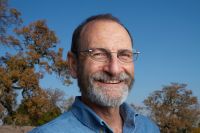In 1970, 20 million Americans turned out for events across the nation to demonstrate their support for a cleaner environment. This year marks the 50th anniversary of that historic event. But with the world struggling to deal with the coronavirus, long-planned celebrations of this year’s Earth Day have had to change dramatically, with most events happening virtually.
While the nature of the celebrations has had to adapt to accommodate global events, the enthusiasm around Earth Day has not diminished. For example, a live-streamed “Earth Day Future 50: A Celebration” event drew a global audience to hear Stanford experts and alumnus Denis Hayes, one of the original organizers of Earth Day, discuss how far the environmental movement has come and to envision what a sustainable Earth over the next half century might look like.
Stanford is helping to lay the foundation for that greener future in the research its scientists conduct and the way it educates its students. It’s also leading by example by pioneering ways to operate its buildings and support campus life using renewable energy sources.
Below, our experts detail some of the major environmental success stories of the past half century; Stanford community members share what Earth Day means to them in this time of separation; we provide an update on some of the university’s sustainability goals; and the dean of Stanford’s School of Earth, Energy & Environmental Sciences (Stanford Earth) reflects on the first Earth Day and his expanding views about the planet and its history.
Stanford community members share their thoughts about Earth Day and what it means in this time of separation. (Video by Farrin Abbott and Kurt Hickman)

Newsha Ajami / Clean Water Act
“The Clean Water Act has evolved and adapted to address our broader understanding of how to best protect water resources. [It] has been a catalyst for change, and has fostered innovation and technical advancement to meet evolving regulatory requirements. It has enabled more harmony between human activities and social and environmental health.”
Ajami, director of urban water policy at Stanford’s Water in the West program, discusses the profound impact of the Clean Water Act.

Chris Field / Paris Accord
“It established a framework for predictable future changes in emissions reductions and the policies required to achieve them. Before the agreement, markets had no way to plan. It also established the idea that the solution to climate change will emerge gradually over time and not in one grand bargain. It is a framework for building trust at the same time as technologies.”
Field, director of the Stanford Woods Institute for the Environment, describes the Paris Agreement of 2015 as a success story waiting to unfold.

Rob Jackson / Solar Energy
“Its importance goes far beyond fighting climate change. Cheap renewables are creating 100,000 jobs a year in the United States. They’re saving thousands of lives annually by eliminating coal pollution. They’re helping to drive a revolution in electric cars and trucks.”
Jackson, a professor of Earth system science, shares his excitement for the future of solar power.

Eric Lambin / Global Cooperation to Reduce Amazon Deforestation
“This illustrates that adoption of more sustainable practices on a broad scale almost always involves the collaborative efforts of public, private and civil society actors. These key players have different missions and goals, but when they collaborate and form coalitions, they are able to create solutions to complex environmental problems. I hope the current government of Brazil will restart this collaboration and help reverse the recent rise of deforestation.”
Lambin, a professor of Earth system science, looks back on global cooperation to reduce Amazon deforestation.

David Lobell / Food Production Technology
“While the private sector played a key role in agricultural improvements, it was really the public nature of research across U.S. institutions and the world that was critical for most crops and regions. Agricultural success is a key part of environmental success. If we had dismissed technologies we now take for granted, we would be in a much worse environmental state than we are currently.”
Lobell, director of the Center on Food Security and the Environment, considers the success of food production technology.

Steve Luby / Removing Lead from Gasoline
“There is a huge environmental benefit when we consider the human health angle of these types of problems. Lead can cause damage throughout the entire web of life, but the most persuasive argument for reducing environmental exposure was its effect on people.”
Luby, an epidemiologist, recounts the story of lead’s phase-out in the U.S.

Fiorenza Micheli / Marine Protected Areas
“Progress has been driven by compelling evidence that Marine Protected Areas yield important benefits for not only our oceans and the many species that live there, but also for people. More MPAs should be created and their networks expanded to improve management, effectiveness and current gaps in protection.”
Micheli, codirector of the Stanford Center for Ocean Solutions, explains Marine Protected Areas’ ripple effects on natural ecosystems and people’s livelihoods.

Kari Nadeau / Montreal Protocol
“Skeptical world leaders were asked to sign the agreement even if they only thought there might be a possibility that chlorofluorocarbons played a role. They were guarding against that possibility for future generations. I love what this story says about key principals of human behavior and motivation – we protect our planet so our families can lead healthy and sustainable lives into the future.”
Nadeau, director of the Sean N. Parker Center for Allergy & Asthma Research at Stanford, puts the Montreal Protocol’s lessons into perspective.

Gabrielle Wong-Parodi / Default Settings
“The substantial change in our behavior required to meet the challenge of global climate change can be daunting. Effective interventions are those that make better environmental behavior an easy choice. Default settings are a great example.”
Wong-Parodi, an assistant professor of Earth system science, explains how resource-conserving default settings on appliances and other technologies could have substantial impacts on the environment.






















